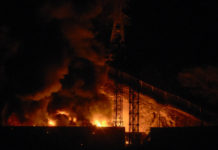Documents cited in a legal challenge against the Israeli government acknowledge that officials knew operation was ‘illegal’ post-1948
31 January 2022
Newly unearthed Israeli historical records reveal officials’ relentless efforts to forcibly empty Palestinian lands of their Bedouin inhabitants in the Negev during the 1950s.
Haaretz reported that the records were revealed as part of a legal case over land ownership pursued by Palestinian citizens of Israel in al-Araqeeb, one of the dozens of villages deemed illegal by Israel and barred from water, electricity and transportation services, among others.
Araqeeb was demolished 197 times by Israel, which seized its lands, and its Palestinian inhabitants have long challenged the Israeli government in courts over the issue.
Haaretz reported on Monday that the Israeli government is considering the case as of “national strategic” importance to set the bar of other lawsuits filed by Palestinian citizens of Israel contesting the confiscation of their lands.
However, Araqeeb’s case has been followed with an opinion and appendix by Gadi Algazi, an Israeli history professor at Tel Aviv University, who spent the past eight years studying the government memos, records and letters regarding the Negev, the largest region in the country.
Algazi had revealed documents as part of the legal case of numerous plans to push Palestinians, who remained in what became Israel after the 1948 war, out of their lands.
A military operation was set up by Moshe Dayan, the southern region commander, in November 1951 to kick out Palestinian Bedouins from areas in the northwest of the Negev to the east and from north of Hebron-Beer Sheva road to the south of it.
This would turn Palestinians who became citizens of Israel into tenants.
“The transfer of the Bedouins to new territories will nullify their right as landowners and they will be [treated] as tenants of government lands,” Dayan wrote in a letter, first reported by Haaretz.
Dayan’s plan was then approved by Israel’s army chief of staff Yigael Yadin, which also suggested that if the Palestinians were not “voluntarily transferred”, the Israeli fledgling forces would “be forced to transfer them” and forcibly remove them from their lands.
Officials at Israel’s Ministry of Justice believe that Araqeeb’s case would end like its predecessor, in other words, in favour of the government. Still, these historical documents unearthed by Algazi could have legal implications, Haaretz said.
The village of Araqeeb spread over 200 dunams (200,000 square metres), and what remained of it, which Israel continuously demolished, has been rebuilt repeatedly.
Palestinian lands in Araqeeb were seized, like many other villages, according to the 1953 Land Acquisition Law.
Israel said that lands in the Negev, which Palestinian owners did live on between 15 May 1948 and 1 April 1952, belonged to the Israeli government that had expropriated 247,000 dunams in the Negev.
The new historical records reveal that Palestinians in that period were forcibly deported by Israeli forces deploying threats, violence, bribery and fraud, Haaretz reported.
‘Discrimination and neglect’
Algazi told Haaretz that senior Israeli officials knew that the operation to deport Palestinians from the Negev was “illegal”, thus they avoided giving them “written eviction orders”.
He also said that the records attested to a resistance undertaken by Palestinian Bedouins against the Israeli plan to move them out of their lands.
“[It was] a revelation the stubbornness with which they tried to hold on to their land, even at the cost of hunger and thirst, not to mention threats and military violence,” Algazi told Haaretz.
In recent weeks, hundreds of Palestinian citizens of Israel in the Negev have protested against a forestation plan in their villages led by the Jewish National Fund (JNF), which they see as a way to deprive them of their lands.
On Sunday, almost 200 of them demonstrated outside Israeli Prime Minister Naftali Bennett’s office in Jerusalem against the plan, calling it a “policy of discrimination and neglect”.
About 300,000 Palestinian citizens live in the Negev; 100,000 live in 35 unrecognised villages and lack essential public services.
This article is available in French on Middle East Eye French edition.
Published atwww.middleeasteye.net
We remind our readers that publication of articles on our site does not mean that we agree with what is written. Our policy is to publish anything which we consider of interest, so as to assist our readers in forming their opinions. Sometimes we even publish articles with which we totally disagree, since we believe it is important for our readers to be informed on as wide a spectrum of views as possible.











